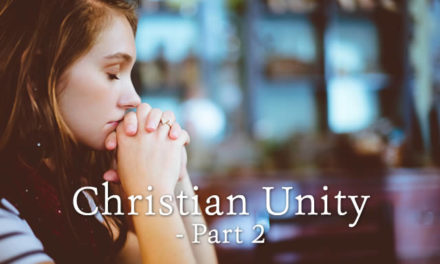Part 1
Now I beseech you, brethren, by the name of our Lord Jesus Christ, that ye all speak the same thing, and that there be no divisions among you; but that ye be perfectly joined together in the same mind and in the same judgment.
1 Corinthians 1:10
Is it possible to achieve Christian unity where we “all speak the same thing” and there be “no divisions” among us? There are many bible-based cults that will say yes it is possible. These cults will also say that the many denominations among Christians is proof that we are not of the Lord, that we are apostate.
So the question before us is, how do we put our divisions within a New Testament framework?
First of all, we should be clear that our divided condition is not to be preferred over greater unity. When Christians disagree on many things the energy and strength that comes from unity is sapped. Therefore, division is a weakening of our witness and our human capacity to promote the gospel.
But what is the alternative? Should we seek to unify denominations? Should we seek to obliterate doctrinal boundaries? Should cultural and traditional diversities be ignored in favor of a unified organization? Or unified doctrinal statements? Or unified liturgies? Or unified social and cultural standards. And who judges?
The Cults Will Judge!
Anyone who has spent much time talking to Jehovah’s Witnesses or Mormons will eventually hear about how divided “Christendom” is and how that is a mark of our apostasy. Jehovah’s Witnesses will say they “all speak the same thing” as Scripture commands.
Indeed, in any Kingdom Hall in the world you will hear the same talk, or message, being given on any given meeting day. To them this is proof they are ruled by Jehovah.
The Mormons base their claim to being the only true church of Jesus Christ on the allegation that Christianity apostatized shortly after its beginning and the gospel was lost until Joseph Smith restored it in 1830. Thus all Christian churches today are apostate and their divided status is an evidence of that. Mormons will point with pride to their unity.
The author recalls an incident many years ago that gives a reverse illustration of this mindset among the Mormons. A solitary Mormon missionary together with an elderly member of the First Ward in Columbus, GA kept an appointment with one of the friends of Watchman Fellowship. This friend invited the author, and two other friends to join him in the meeting. The four of us engaged the missionary in a spirited discussion on several topics, mostly doctrinal, for the evening.
As the missionary was leaving he asked what church we attended, probably thinking it would be good to know who to tell the other missionaries to watch out for. One at a time we answered, “Baptist” “Assembly of God” “Christian & Missionary Alliance” and “Independent”. The look on the face of the missionary was almost incredulous. We agreed that he must have been thinking “I thought they were all divided and didn’t agree with each other!”
That incident illustrates a unity that is based on something other than organizational unity or a party line type agreement on every issue. So upon what is unity based?
This article will look at the cultic view. Part 2, next month, will examine the Biblical view. The mindset of the cults regarding the issue of unity is twofold.
First — Organizational Unity
This is the idea that God has “one true religion” and it is embodied in an organization. If you are witnessing to someone in a bible-based cult you must keep in mind that it is difficult for him or her to think outside of an organizational box. They have been conditioned to think in a tangible, visible, way about the “container” of God’s truth on earth.
The Watchtower Society said, “That for more than sixty years Jehovah has used faithful men, C.T. Russell and J.F. Rutherford, as his servants to fill the office of president, the chief executive office of the Society, to oversee the affairs of the earthly part of Jehovah’s organization under direction from the Lord” (1943 Yearbook of Jehovah’s Witnesses, page 226).
The Watchtower protects its organizational unity by disfellowshipping any who would question or oppose the Society. This is the same method dictators use to stifle dissent before it becomes open rebellion. They deal with disagreement while it is small, a single individual.
The Society leaders never let dissent grow to the level of a movement or faction within. However, in the past there have been a couple dozen factions that split off the Watchtower. Today because of the disfellowshipping practice this is nipped in the bud.
Mormonism is based upon the concept known in Christian denominations as apostolic succession, the passing of spiritual authority from one generation to the next via the “laying on of hands,” or some other method.
In Mormonism the essential power is that of the Aaronic and Melchisadec priesthoods. That “authority” must be passed from generation to generation properly. If it is done improperly, or not according to Mormon teaching, then it has not been passed on and the succeeding generation does not have the “authority” of the priesthood.
Therefore, the Mormons go to great lengths to document the legitimacy of their priesthood authority. It is illustrated by this quote;
“Joseph Smith received the Aaronic Priesthood under the hands of John the Baptist. He received the Melchisadec Priesthood under the hands of Peter, James, and John” (A Marvelous Work And A Wonder, page 404).
To the Mormon this is a God-ordained system for preserving unity. It just didn’t work.
When Joseph Smith was assassinated Brigham Young took control of the church and eventually led them to Utah. However, there were other contenders for the leadership. Most prominent among them was Joseph Smith’s son whom a significant portion of the Mormon population thought should be the next President. Today we know this faction as the Reorganized Church of Jesus Christ of Latter Day Saints, now known as the Community of Christ.
We can see that from the very beginning of Mormonism they had disunity. Today there are well over 100 splinter groups calling themselves Mormons or Latter Day Saints.
One of the potential weaknesses of establishing unity on an organizational basis is that it can lead to abuses that are commonly found in governments. Dictatorship by those holding the reins of power is common and it leads to losses of personal freedoms, especially the freedom of conscience. Another is the establishment of a political pecking order and elitism. This superior attitude can lead to pride and arrogance by those elite and a wide gulf separating them from the rest of the people.
Second – Doctrinal Unity
Part of the organizational unity is the “Party Line” doctrine of the group. The least important doctrine can be treated as if it is the most fundamental of doctrines if it is perceived by the cult as an attack on the integrity of the claims to be the “one true religion.” Even small dissents are like the crack in the concrete into which a seed falls, germinates, and grows to break apart the foundation. So doctrinal unity is enforced to the greatest degree possible.
The Watchtower Society exercises a high degree of control of what its members think and say. Dissent, they say, arises from “independent thinking” and truth is received through association with Jehovah’s Witnesses.
“From such experiences it can be seen that Jehovah God caused the Bible to be written in such a way that one needs to come in touch with His human channel before one can fully and accurately understand it. True, we need the help of God’s holy spirit, but its help also comes to us primarily by association with the channel Jehovah God sees fit to use” (Watchtower, Feb. 15, 1981, page 17).
There is a little bit more intellectual wiggle room in Mormonism but, just as the Watchtower, they will clamp down on any views that pose a threat to the doctrinal system.
The Ward Teacher’s Message, Deseret News, of May 26, 1945, said, “When our leaders speak, the thinking has been done. When they propose a plan – it is God’s plan. When they point the way, there is no other which is safe. When they give direction, it should mark the end of controversy. God works in no other way.”
The conclusion from such an attitude is that truth flows through the officials, not through the text of scripture with the Holy Spirit enlightening the mind. Fallen man will inevitably contradict himself and then cover-ups, deception, and threats become the tools of maintaining doctrinal purity.
One of Dr. Robert Lifton’s Eight Criteria of mind control is called Sacred Science. Lifton says that a cult’s doctrine is too sacred to call into question.
When it is questioned another of Lifton’s Criteria comes into play, the Doctrine Over Person, which says that the person is only valuable as he conforms to the ideology of the cult.
And then a third Criteria may follow that in rapid succession, the Dispensing of Existence. This Criteria says that a person can be dispensed with because they have questioned the system. In history, the dispensing of existence has included the entire spectrum of ways in which a person may be dispensed, from murder at one extreme to marking or labeling at the other. The person ceases to be someone who is respected.
If you talk to any former cultist they can probably give you chapter and verse on how this happened to them. Even Christians who come through a church fight can tell you how the opposing side views them. This result is a tragedy when it occurs in the Body of Christ.
To Be Continued…
Part 2 of this article will address the form of unity that should be found in the Body of Christ.
By David Henke






